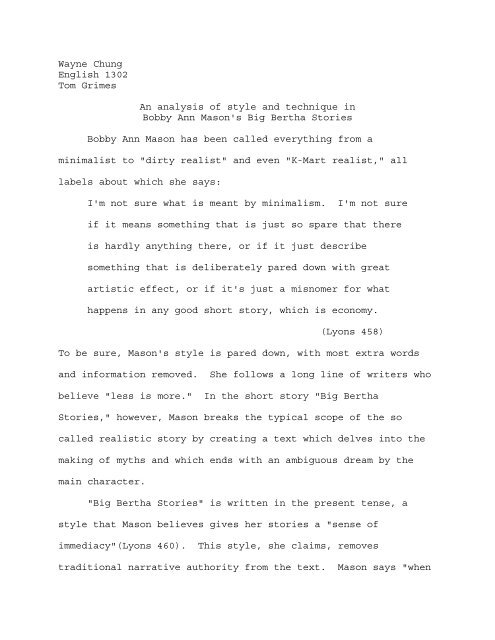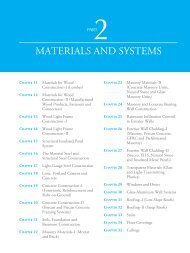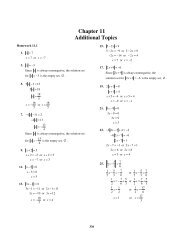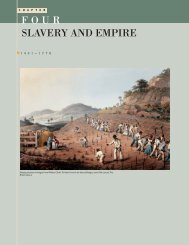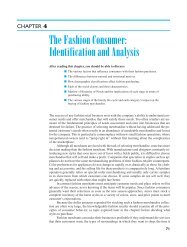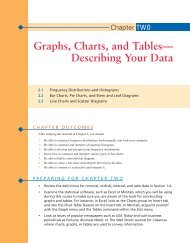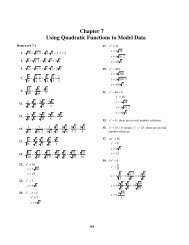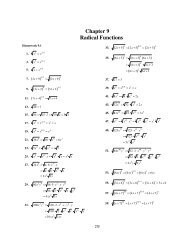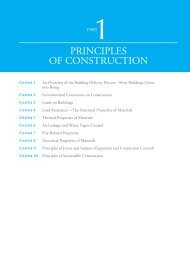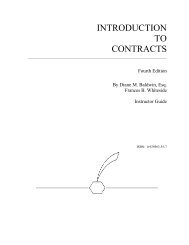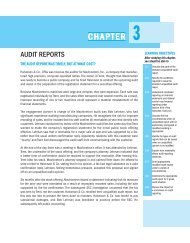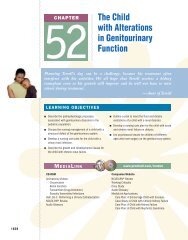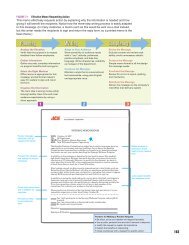You also want an ePaper? Increase the reach of your titles
YUMPU automatically turns print PDFs into web optimized ePapers that Google loves.
Wayne Chung<br />
English 1302<br />
Tom Grimes<br />
An analysis of style and technique in<br />
Bobby Ann Mason's Big Bertha Stories<br />
Bobby Ann Mason has been called everything from a<br />
minimalist to "dirty realist" and even "K-Mart realist," all<br />
labels about which she says:<br />
I'm not sure what is meant by minimalism. I'm not sure<br />
if it means something that is just so spare that there<br />
is hardly anything there, or if it just describe<br />
something that is deliberately pared down with great<br />
artistic effect, or if it's just a misnomer for what<br />
happens in any good short story, which is economy.<br />
(Lyons 458)<br />
To be sure, Mason's style is pared down, with most extra words<br />
and information removed. She follows a long line of writers who<br />
believe "less is more." In the short story "Big Bertha<br />
Stories," however, Mason breaks the typical scope of the so<br />
called realistic story by creating a text which delves into the<br />
making of myths and which ends with an ambiguous dream by the<br />
main character.<br />
"Big Bertha Stories" is written in the present tense, a<br />
style that Mason believes gives her stories a "sense of<br />
immediacy"(Lyons 460). This style, she claims, removes<br />
traditional narrative authority from the text. Mason says "when
an author [narrator] speaks in the present tense you get the<br />
feeling that s/he doesn't know any more than you do about what's<br />
happening"(Lyons 460). In contrast she says that the past tense<br />
creates the assumption that the narrator "has sorted events out,<br />
has a perspective on them, [and] has judged them in some<br />
sense"(Lyons 460).<br />
In "Big Bertha Stories" the use of the present tense allows<br />
the reader to experience the action of the story as the<br />
characters themselves experience it. Rather than the usual<br />
filter we get from a traditional narrative we are presented with<br />
a camera-eye view of the events. Information and events are<br />
relayed in a mater-of-fact style, which effectively removes much<br />
of the narrative attitude from these sections. Mason then adds<br />
the character's attitude, in this story Jeanette's thoughts, to<br />
create point of view. For example, on the opening lines we see<br />
that: "Donald is home again, laughing and singing. He comes<br />
home from Central City, Kentucky, near the strip mines, only<br />
when he feels like it, like an absentee landlord checking on his<br />
property" (655). The fist lines read much like a movie script,<br />
an influence, which Mason quickly acknowledges. We see the<br />
present action of Donald's return followed by information<br />
telling us where he comes from and finally Jeanette's attitude<br />
toward his return. The second sentence is a marriage of present<br />
tense distance and character point of view.
In "Big Bertha Stories" the uncertainty of the present<br />
tense mirrors the uncertainty of the plot. There is no clear<br />
resolution in this story and, though Jeanette clearly changes,<br />
we are left unsure of whether any changes will last. Since the<br />
events in a past tense story have already happened, the attitude<br />
of such a narrator will inform us as to the present situation of<br />
a character as it relates to the past. For example, in "Heat"<br />
by Joyce Carol Oates we see that the narrator relates the story<br />
of the twins murder to her own life. We see her own<br />
unreliability through the way she pays out information. In "Big<br />
Bertha Stories" the present tense voice does not allow us this<br />
same grasp. Not only does the present tense allow a sense of<br />
immediacy, but it also causes a sense of ambiguity, especially<br />
in "Big Bertha Stories". In choosing the present tense for this<br />
particular story Mason chooses to leave us with an anti-<br />
resolution. In this case, the lack of clear resolution gives us<br />
the sense that the Jeanette's life has not completely changed<br />
for the better, though she might like to believe it has.<br />
The present tense also creates the enigmatic ending of the<br />
story. As Jeanette dreams we see the dream itself, not her<br />
remembrance of the dream, as we get in John Cheever's "The Death<br />
Of Justina," which is told in past tense and allows for a<br />
narrative filter or "slant" on the events in the dream. This<br />
present tense effect allows the reader to interpret the dream as
Jeanette dreams it. This passage is, as in the beginning,<br />
almost devoid of character attitude: "That night, she has a<br />
nightmare about the trampoline. In her dream, she is jumping on<br />
soft moss, and then it turns to a springy pile of dead bodies"<br />
(670). Once again we get a camera eye view of the dream as it<br />
occurs. By choosing to use this removed point of view and<br />
narrative style, Mason sets to reader up to be confused as to<br />
the meaning of the ending. Unfortunately, this lack of clear<br />
meaning and the introduction of an abrupt dream sequence leaves<br />
the reader too confused to make much sense of the ending. This<br />
is the main reason the story does not achieve resolution, and<br />
the work itself fails to close properly.<br />
When the dream sequence from Cheever's "The Death Of<br />
Justina" is contrasted with that found in "Big Bertha Stories"<br />
we can see where the present tense fails to illicit the proper<br />
response. Mason uses the present tense for a sense of immediacy<br />
and this is the main reason this dream sequence does not work<br />
and creates a frustration in the reader. Cheever's story is<br />
told in past tense, which allows us to get a grasp on the<br />
unreliability of this particular narrator. The absurdity which<br />
precedes the dream sequence properly sets up the dream sequence<br />
and the use of the unreliable narrator allows the reader to<br />
believe the weird nature of his dream. This absurdity is<br />
underscored, as are many similar images and lines, by the fact
that the narrator denies any understanding of the dream, though<br />
clearly the reader knows why he had the dream. As the narrator<br />
asks "What could be the meaning of this?" we do not believe him<br />
because other images and ideas from his conscious mind, such as<br />
patriotism and class warfare, are tied together by his dream.<br />
Cheever's narrator dreams of a supermarket where immigrants<br />
graze over unlabeled packages while being over seen by brutish<br />
figures (550). This ties in with several key thematic elements<br />
in the narrative: for example, the character works as an<br />
advertisement writer (551). He calls his boss "satanic" (543).<br />
On two occasions he speaks of this confusion and disappointment<br />
in the American Dream (545). All of these key elements in the<br />
story are recalled by the dream sequence and therefore Cheever<br />
successfully incorporates a dream into his story.<br />
The use of present tense combined with the narrative<br />
"camera eye" view of events in "Big Bertha Stories" does not<br />
allow the reader to get Jeanette's perspective on the dream.<br />
Beyond this, the dream does not completely tie the thematic<br />
elements of the story together, nor does it recall the only<br />
supernatural aspect of the story in reference to the myth of Big<br />
Bertha. One possible connection is the internalization of<br />
Donald's violence by Jeanette and a signal of the deterioration<br />
which still exists in Jeanette's life. These meanings, however,<br />
are inferred after several close readings of the text rather
than apparent in the language itself. The effect of this dream<br />
sequence is enigma, and confusion on the part of the reader<br />
ensues. We leave this story with feeling that it is incomplete.<br />
The plot and story of "Big Bertha Stories" seems very<br />
straightforward. Donald, a Viet Nam veteran, can not escape his<br />
nightmares about the war and often takes long leaves from his<br />
family. This problem contributes to the disintegration of his<br />
family. Jeanette and Rodney are left with the economic,<br />
emotional and physical loss of their husband and father.<br />
The story gets a bit tricky when we start to understand<br />
that Jeanette judges her own relationship and social standing by<br />
outside standards. As Donald takes the family to the shopping<br />
center, Jeanette feels "almost like a normal family" (657). In<br />
her worldview, "normal families" shop, go to church and don't<br />
tell "Big Bertha Stories," in short, they are the opposite of<br />
Jeanette's family. When confronted by any abnormal situation,<br />
the Snake man and his tarantula for instance, Jeanette<br />
immediately feels as if her family is somehow failing to adhere<br />
to normalcy. When the Snake man tells her "If you drop a<br />
tarantula, it will shatter like a Christmas ornament," she feels<br />
her own "family disintegrating like a spider shattering" (656).<br />
Jeanette seems to understand by the end of the story that<br />
she thought of Donald primarily as a husband, a<br />
provider, someone whose name she shared, the father of
her child, someone like the fathers who come to the<br />
Wednesday night all you can eat fish fry. She hasn't<br />
though of him as himself. (669)<br />
This revelation corresponds with Donald entering the V.A.<br />
hospital so he can rid himself of his demons and become a<br />
"normal" husband. As we read this passage we are shown that<br />
Jeanette uses outside standards of how normal husbands and wives<br />
act to view her own unique situation--a point illustrated<br />
throughout the text well, though Mason seems to feel it<br />
necessary to drive the point home in the above told passage.<br />
Here Jeanette realizes her main flaw, though this revelation<br />
does nothing to change her actions.<br />
The way outside judgments affect Jeanette runs thematically<br />
through the story. The therapist, her parents and the men in<br />
the diner all taint Jeanette's view of Donald. Jeanette angers<br />
as the therapist wants her to talk about her own personal<br />
experiences, because she believes she is seeing him to talk<br />
about Donald's problems. In fact the therapist is the only<br />
person in the text who sees that Jeanette's difficulty is with<br />
herself rather than her husband.<br />
The outside world infiltrates Jeanette's inner state of<br />
mind, just as it does with her husband, whose destructive job as<br />
a strip miner constantly reminds him of the devastation in Viet<br />
Nam. The simplest example of this concept occurs as Jeanette
jumps on Rodney's trampoline and a neighbor tells her "you'll<br />
tear your insides loose"(670). Someone with confidence and<br />
direction would ignore such a wives tale, but Jeanette allows it<br />
to modify her behavior. We are told that she stops jumping so<br />
much, even though she obviously enjoys it (670).<br />
Because the men she works around are "normal" men,<br />
providers, successful drivers of Cadillacs, and flirtatious<br />
womanizers, Jeanette expects that a successful father/husband<br />
will provide both material and emotional needs. In her mind<br />
however, the material provisions take precedent. In fact,<br />
Jeanette only feels like she has a "normal" family as Donald<br />
takes her shopping, brings Rodney a present, brings money home<br />
for the family(656). She fails to realize that the Big Bertha<br />
Stories are myths which, for Donald, create emotional support.<br />
Jeanette wants a normal man who does normal things. Donald, as<br />
we see in the course of the story, is not a normal man.<br />
Jeanette refuses to deal with situations which are ugly or<br />
painful which is one reason her marriage is failing and when she<br />
does deal with these situations she looks to an outside<br />
authority to enforce her view as being right. Her use of the<br />
Therapist is solely to discuss Donald, and when she is<br />
confronted by questions about her own thoughts she avoids them,<br />
resenting Dr. Robinson because he "seems to be waiting for her<br />
to make something out of" her ordeal with Donald (661). She
also resent being treated as if she is "the one who's<br />
crazy"(661). Instead of relying on her own mind to make<br />
decisions she is maddened by the fact "that [the therapist]<br />
won't tell her what to do"(661).<br />
A second authority to whom Jeanette turns is her own<br />
mother. Although Donald never acts violent towards Jeanette, it<br />
is Jeanette's mother who warns her about this possibility. As<br />
with her daughter, the mother also gets her information from an<br />
outside authority by reading "in the newspaper that a veteran in<br />
Louisville held his little girl hostage" and "had a shootout<br />
with the police and was killed" (658). As with the Snakeman,<br />
the trampoline shouter and the therapist, Jeanette's mother<br />
manages to taint her view of Donald to the point where she<br />
becomes afraid of him.<br />
Part of the reason Jeanette feels the way she does is<br />
because she associates material and superficial items with<br />
emotional support. She forgives Donald's long absences because<br />
he often brings money and food, which alloWS her to avoid using<br />
the food stamps she must take on welfare (655). Her favorite<br />
thing to do is shop (669). Later, as Donald comes to see his son<br />
at Christmas time, she is angry because Donald "never bring[s]<br />
him anything"(664). As Jeanette cries in bed beside Donald she<br />
mistakenly thinks that his problems are cause by the fact that<br />
Donald does not "care what [Jeanette] looks like anymore," again
she mistakes emotional content for materialism as represented by<br />
superficial ideas (6).<br />
The men who flirt with Jeanette also give her money, along<br />
with sexual notes. She is flattered by their invitations to<br />
ride the "Delta Queen" mainly because she "knows how expensive<br />
that was"(662). As she allows the electronics salesman to take<br />
her out in the Cadillac she is struck by his "flamboyant"<br />
behavior and is drawn to the "automatic windows. . .stereo<br />
system, and lighted computer screen" (663). Jeanette realizes,<br />
however, that the salesman is "really not very interesting" when<br />
compared to Donald (663). Jeanette is seduced by her material<br />
desires until she realizes that Donald is more emotionally<br />
fulfilling despite his inability to provide for his family.<br />
Jeanette is horrified by the Bertha stories because they<br />
are grotesque and violent. She projects this horror onto<br />
Rodney, whose "nightmares" are alluded to, but never explained<br />
or explored. We are told that Rodney draws pictures of his<br />
"nightmares" but are only privy to one drawing of "Big Bertha's<br />
titties" which are "two huge circles, filling the page, with<br />
three tiny stick people in he corner"(663). This image is less<br />
than horrific to the reader, and the effect is that we doubt the<br />
authenticity of Rodney's "nightmares." This is especially<br />
interesting because Jeanette sees Donald's nightmares as
"trivial" while she sees Rodney's "tittie" dream as a nightmare<br />
(658).<br />
The most disturbing characteristic we see in Jeanette is<br />
her inability of empathize with Donald's memories of Viet Nam.<br />
We are told that in the past "she always said the wrong thing in<br />
her efforts to sooth" Donald (657). The same is true in the<br />
present action of the story. When Donald broods about Viet Nam,<br />
she responds by asking "Wasn't Viet Nam a long time ago?"(657).<br />
This lack of empathy corresponds with all of his attempts to<br />
relate the carnage he witnessed in Viet Nam. Her lack of<br />
empathy stems from the fact that "She didn't want to hear about<br />
Viet Nam. She thought it was unhealthy to dwell on [Viet Nam] so<br />
much (658). Not only does Jeanette reveal that she does not<br />
want to reflect on Viet Nam, but through the course of the story<br />
it becomes apparent that she won't think of any painful memory<br />
or event for very long.<br />
Much of the time, when Donald tries to explain Viet Nam to<br />
Jeanette, she changes to subject. As Donald tries to explain<br />
that during his strip-mining job he is constantly "looking for<br />
those tunnels where the Viet Cong hid"(665). He tries to relate<br />
this unknown aspect of the tunnels to something Jeanette can<br />
fathom--Mammoth Cave. Unfortunately, Jeanette again says "the<br />
wrong thing" as she points out "Mammoth Cave's one of the<br />
natural wonders of the world"(665). Donald clearly needs an
outlet to allow him to release the horror he witnessed during<br />
the war. Because she constantly avoids his discussions, he<br />
tries to reach her by drawing out his story, to which she says<br />
"Why are you going through so much trouble?" (660). Jeanette<br />
misunderstands the meaning of Donald's drawing. He is telling<br />
her what the reader understands--that he can not get her to<br />
listen to him so he chooses a nonverbal form of communication to<br />
help him get the message to her. Jeanette keeps subverting<br />
Donald's attempts to deal with the war, which drives him away<br />
from his family, and finally to the VA hospital.<br />
The main characterization of Donald, which is not filtered<br />
through Jeanette or her mother, is that he is obsessed with<br />
making his wife, and by extension his family, understand what he<br />
witnessed in Viet Nam. Donald feels that he had a part in<br />
"ruin[ing]" Viet Nam, which is why his job as a land "reclaimer"<br />
is very important to him (657). Donald tries six times over the<br />
course of the story to get Jeanette to understand his experience<br />
in Viet Nam, but it isn't until the final time, as he is<br />
explaining about Phan, and how her village was destroyed that<br />
Jeanette connects with him. By the third time he has decided<br />
that she "will never understand" and his discussions turn more<br />
animated and violent as a result. What allows her to connect to<br />
him is the way he tells her that the last story "don't mean<br />
nothing"(667). This last story centers around the beauty of
Viet Nam and his relationship to Phan, a girl he describes as<br />
beautiful," and "gentle," like she had "grown up out of the<br />
jungle" (667). The story also reflects his shame and guilt at<br />
having blown the jungle and Phan's village "sky high"(668). The<br />
jungle, the people, and especially Phan disappear, leaving<br />
Donald no closure to the experience. When Jeanette asks "is<br />
that the end of the story?" and Donald tells her "I don't know,"<br />
we get a very real sense that Donald will always search for a<br />
closure to his violent experience in the war. Not<br />
coincidentally, this story is the triggering event for Donald's<br />
decision to enter the VA hospital.<br />
Jeanette's mother, the therapist, and the social worker are<br />
all characterized through what they say to Jeanette as opposed<br />
to what the do in the story. Jeanette's mother is a gossip who<br />
plants the first seeds of fear in her daughters head. It is she<br />
who takes Rodney to church, where he hears that his father is a<br />
messenger from the devil"(669). The therapist and social worker<br />
both play much the same role. Both characters encourage<br />
Jeanette to start doing something for herself, rather than<br />
waiting for something to change. The therapist tries to get<br />
Jeanette to realize that the families problems are not all a<br />
result of Donald's behavior, and the social worker encourages<br />
her to escape reality by reading. Both of these suggestions are
completely ignored by Jeanette until Donald enters the VA<br />
hospital.<br />
Rodney is a prototypical child. He is desperate for a<br />
father figure in his life and is obviously very impressionable.<br />
He may be the most sympathetic character in the story, but for<br />
all the wrong reasons. Naturally we sympathize with his<br />
situation;he's poor, he's fatherless, and he fears being<br />
abandoned. The ritual of hiding from Donald every time his<br />
father returns becomes an affirmation of the fact that his<br />
father will not abandon him. After all, Rodney waits until his<br />
father searches all over the house for him, to rush out and hug<br />
his father's knees (656). The boy is impressionable enough to<br />
believe that his father is a "messenger form the devil" not only<br />
because his grandmother says so, but because he recognizes<br />
something is wrong with his father, possibly because Jeanette<br />
constantly points out the violent, disturbing nature of the "Big<br />
Bertha Stories." His "nightmares" are interpreted by Jeanette<br />
as a result of Donald's stories, but in reality they are caused<br />
by his unstable family life.<br />
Donald substitutes myth-making for affection. Big Bertha<br />
is first a way for him to connect with his son and a method of<br />
coping with the deterioration of his family life. He tells the<br />
stories as a way to get his son to forgive him and as<br />
entertainment. The myths that he creates around Big Bertha help
him find a common ground between him and his son as any story or<br />
myth creates a bond between speaker and listener. To Donald,<br />
the stories are his fairy tales, and most of this time the<br />
incorporate element which any young boy would be interested in:<br />
war, action, and supernatural heros are all incorporated into<br />
the stories. Jeanette hates the stories because they remind her<br />
that she does not live a normal life.<br />
The stories also help Donald to alleviate the tension<br />
created by his illness, and avoid the emotional conflict caused<br />
by his absences. Nowhere is this better illustrated in the text<br />
than as Jeanette is crying beside him he asks her is she wants<br />
him to "tell [her] a Big Bertha story?" rather then hugging her<br />
(660). Donald avoids talking about his wife's depression by<br />
presenting the myth of Bertha, just as he avoids his son's anger<br />
by telling the stories.<br />
As the plot of "Big Bertha Stories" moves forward Donald<br />
finally has to deal with his problems. As his mental health and<br />
marriage disintegrate, so do the stories. We see that "in the<br />
story, [Big Bertha and] the rock and roll band give a concert in<br />
a place that turns out to be a toxic waste dump, and the<br />
contamination is spread out all over the country. Big Bertha's<br />
solution is not at all clear" (664). Bertha is not longer able<br />
to stave off the deterioration of Donald's family which<br />
parallels Donald's breakdown. When the myth fails as a problem
solver, Donald must face the fact that his wife is afraid of him<br />
and that he must change something about his life.<br />
Another function of the Big Bertha Stories is to find a way<br />
for Donald to legitimize the violence he witnessed in the<br />
destruction of Viet Nam, a place he thought was beautiful, and<br />
the violence he witnesses each day in strip mining. They are a<br />
way for his side to win the war much the same way movies such as<br />
"Missing in Action" and "Rambo" allowed American to claim a<br />
fictitious victory over the Viet Cong by allowing heros to<br />
return to Viet Nam and defeat the communists. When this all-<br />
powerful legend is connected with the war in Viet Nam it always<br />
in a context of winning the war, and doing so without blowing up<br />
all of the beauty of the country. The stories serve as a way<br />
for Donald to share the carnage and violence with his son,<br />
without sharing the experiences.<br />
Because Bertha is a strip mining machine, the thematic<br />
element of strip mining pays a major role in the story. This<br />
element is tied together by the way Jeanette refers to the V.A.<br />
psychiatric unit as "strip mining" and further tells Donald<br />
"That's what they'll do to your head. They'll dig out those<br />
ugly memories" (668). Her view is the opposite of Donald. He<br />
sees what he does as "reclaiming the land" which relates more<br />
fittingly to what the VA seeks to do(665). Jeanette would have<br />
her husband altered, like a cat, or like the strip mines, which
are hidden because they would give travelers "a poor image of<br />
Kentucky" (661). Rather than understanding that Donald need to<br />
reclaim his memories in a way that allows him to deal with his<br />
role in the destruction of Viet Nam, Jeanette would rather see<br />
those memories removed altogether so she can retain a positive<br />
image of her family.<br />
For Donald, strip mining also serves as a metaphor for the<br />
destruction of Viet Nam. He draws the connection explicitly as<br />
he tells Jeanette that war was strip mining, "stripping off the<br />
top [of the culture]" (657). Donald believes if he can "reclaim<br />
the land" he might be able to set things right, but what instead<br />
he is constantly reminded of what happened in Viet Nam.<br />
The main problem found in "Big Bertha Stories" is that it<br />
does not close well. While we are told that Jeanette has<br />
experienced a change in her thoughts about Donald, we do not<br />
actually see what the change is. Essentially Mason creates a<br />
false resolution, which is ambiguous at best. Because Donald is<br />
away the main revelation is told to the reader rather than being<br />
shown by interaction with Donald: "It occurs to her she thought<br />
of Donald primarily as a husband, a provider. . .the father of<br />
her child, someone like the fathers who come to the. . all you<br />
can eat fish fry. She hasn't though of him as himself" (669).<br />
This use of telling does not allow the reader to see any real<br />
change in Jeanette. She ends the story by allowing the reader
to see that Jeanette has fooled herself, and adds the nightmare<br />
as interior proof of this fact.<br />
The reader is supposed to understand what she does not--<br />
that Jeanette's problems don't all stem from Donald, though he<br />
certainly contributes to these problems. Essentially Mason<br />
allows Jeanette to fool herself into believing once Donald<br />
enters the V.A. all her problems are solved. Once the decision<br />
is made to enter the V.A., we are told she looks better, is able<br />
to get a job, and starts reading again (669). In fact, Donald's<br />
absence allows her time to reorganizes her life, by getting off<br />
welfare, rearranging her furniture and assuming a new outlook<br />
(669). The reason her resolution is false is that, like her<br />
problems, her solution is created by an exterior event instead<br />
of a true shift in thinking. We see that she believes she is<br />
changing, and we see that Donald is dealing with his loss and<br />
damage, but Jeanette never addresses the true nature of her own<br />
problems.<br />
The final image of the story is the nightmare, which is<br />
used to evoke a feeling rather than a thought. The language<br />
here shifts from the very straightforward style to a more lush,<br />
descriptive style "she is jumping on soft moss" which turns to a<br />
"springy pile of dead bodies"(670). Nowhere else do we get a<br />
description of Jeanette's surroundings. When Donald's<br />
nightmares occur they are told through Jeanette's POV, and not
shown by the narrative voice. We never see any of Rodney's<br />
nightmares either. Even though the theme of nightmares exists<br />
in "Big Bertha Stories," the imagery, which accompanies such a<br />
theme does not. Mason chose to end her story with the abrupt<br />
inclusion of an image that only ties in one thematic element of<br />
the story. Contrasted with Cheever's use of dream, (as<br />
discussed in the section "Narrative Style") which effectively<br />
ties together more than one element of "The Death Of Justina,"<br />
Mason's use of dream hits just one note. The reader is left<br />
with the feeling that things are not right with Jeanette, but<br />
the thought that occurs is "what does the dream mean?"<br />
Cheever's narrative makes this point evident, Mason's point to<br />
ambiguous. Why a "K-Mart" realist would choose to end this<br />
story with such an image is unclear, and does not fall in line<br />
with Mason's own ideas about language. The reader has to work<br />
harder than the language and the narrative to make meaning from<br />
this image. We have to tie the loose ends together ourselves<br />
based on the ambiguity we feel as we reach the final image.<br />
The failure to close this story may also be a flaw with the<br />
narrative style Mason chooses to use for "Big Bertha Stories".<br />
By choosing to use a distanced narrator combined with the<br />
immediacy of the present tense, Mason may have found herself<br />
unable to filter this dream through Jeanette's consciousness<br />
without completely breaking from her narrative voice.
Mason uses some interesting techniques in "Big Bertha<br />
Stories," which also pose some problems for this story. The<br />
distance created by the narrative voice is too camera-like, and<br />
works against the language, forcing the reader to work far too<br />
hard at interpreting the meaning behind the story. Had the<br />
story been told in the past tense, allowing the character, and<br />
by extension the reader, to "sort things out, to gain a<br />
perspective on things," this story may be far more effective<br />
(Lyons 460).
Works Cited<br />
Cheever, John. “The Death of Justina.” The Oxford Book of<br />
American Short Stories. Ed. Joyce Carol Oates. Oxford:<br />
Oxford University Press, 1992.<br />
Lyons, Bonnie & Bill Oliver. "An Interview with Bobby Ann<br />
Mason." Contemporary Literature.32.4 (1991):448-470.<br />
Mason, Bobbie Ann. "Big Bertha Stories." The Oxford Book of<br />
American Short Stories. Ed. Joyce Carol Oates. Oxford:<br />
Oxford University Press, 1992. 655-670.


